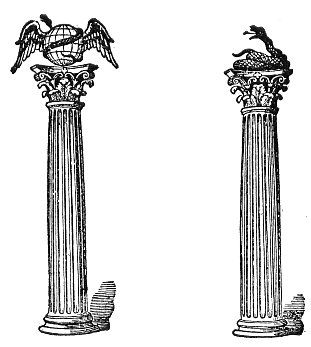Matter being, in their view, as it was in that of St. Paul, the principle of all the passions that trouble reason, mislead the intelligence, and stain the purity of the soul, the Mysteries taught man how to enfeeble the action of matter on the soul, and to restore to the latter its natural dominion. And lest the stains so contracted should continue after death, lustrations were used, fastings, expiations, macerations, continence, and above all, initiations. Many of these practices were at first merely symbolical,–material signs indicating the moral purity required of the Initiates; but they afterward came to be regarded as actual productive causes of that purity.
The effect of initiation was meant to be the same as that of philosophy, to purify the soul of its passions, to weaken the empire of the body over the divine portion of man, and to give him here below a happiness anticipatory of the felicity to be one day enjoyed by him, and of the future vision by him of the Divine Beings. And therefore Proclus and the other Platonists taught “that the Mysteries and initiations withdrew souls from this mortal and material life, to re-unite them to the gods; and dissipated
p. 521
for the adepts the shades of ignorance by the splendors of the Deity.” Such were the precious fruits of the last Degree of the Mystic Science,–to see Nature in her springs and sources, and to become familiar with the causes of things and with real existences.
Cicero says that the soul must exercise itself in the practice of the virtues, if it would speedily return to its place of origin. It should, while imprisoned in the body, free itself therefrom by the contemplation of superior beings, and in some sort be divorced from the body and the senses. Those who remain enslaved, subjugated by their passions and violating the sacred laws of religion and society, will re-ascend to Heaven, only after they shall have been purified through a long succession of ages.
The Initiate was required to emancipate himself from his passions, and to free himself from the hindrances of the senses and of matter, in order that he might rise to the contemplation of the Deity, or of that incorporeal and unchanging light in which live and subsist the causes of created natures. “We must,” says Porphyry, “flee from everything sensual, that the soul may with ease re-unite itself with God, and live happily with Him.” “This is the great work of initiation,” says Hierocles;–“to recall the soul to what is truly good and beautiful, and make it familiar therewith, and they its own; to deliver it from the pains and ills it endures here below, enchained in matter as in a dark prison; to facilitate its return to the celestial splendors, and to establish it in the Fortunate Isles, by restoring it to its first estate. Thereby, when the hour of death arrives, the soul, freed of its mortal garmenting, which it leaves behind it as a legacy to earth, will rise buoyantly to its home among the Stars, there to re-take its ancient condition, and approach toward the Divine nature as far as man may do.”
Plutarch compares Isis to knowledge, and Typhon to ignorance, obscuring the light of the sacred doctrine whose ‘blaze lights the soul of the Initiate. No gift of the gods, he holds, is so precious as the knowledge of the Truth, and that of the Nature of the gods, so far as our limited capacities allow us to rise toward them. The Valentinians termed initiation LIGHT. The Initiate, says Psellus, becomes an Epopt, when admitted to see THE DIVINE LIGHTS. Clemens of Alexandria, imitating the language of an Initiate in the Mysteries of Bacchus, and inviting this Initiate, whom he terms blind like Tiresias, to come to see Christ, Who will
p. 522
blaze upon his eyes with greater glory than the Sun, exclaims: “Oh Mysteries most truly holy! Oh pure Light! When the torch of the Dadoukos gleams, Heaven and the Deity are displayed to my eyes! I am initiated, and become holy!” This was the true object of initiation; to be sanctified, and TO SEE, that is, to have just and faithful conceptions of the Deity, the knowledge of Whom was THE LIGHT of the Mysteries. It was promised the Initiate at Samothrace, that he should become pure and just. Clemens says that by baptism, souls are illuminated, and led to the pure light with which mingles no darkness, nor anything material. The Initiate, become an Epopt, was called A SEER. “HAIL, NEW-BORN LIGHT!” the Initiates cried in the Mysteries of Bacchus.

Moe is the founder of GnosticWarrior.com. He is a father, husband, author, martial arts black belt, and an expert in Gnosticism, the occult, and esotericism.





